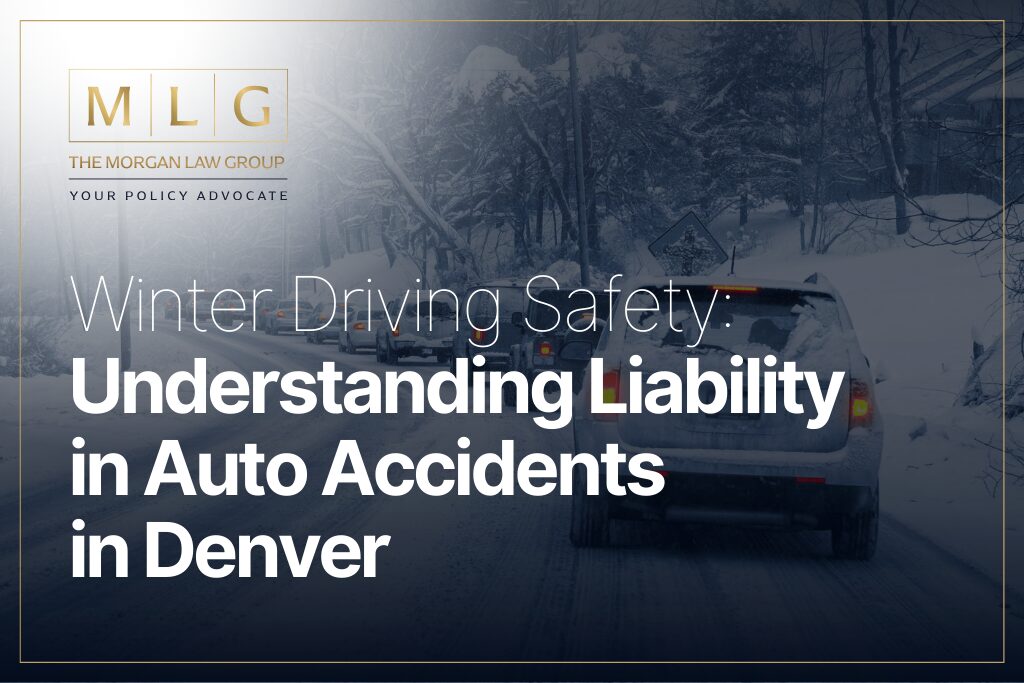Winter weather conditions in Denver introduce a myriad of challenges for drivers. The transformation of the driving landscape in winter is profound, marked by three primary factors:
- Slippery Roads
- Reduced Visibility
- Unpredictability of Other Drivers
In a winter car accident, determining liability for auto accidents in Denver isn’t always straightforward. The harsh weather conditions can play a significant role, and both drivers’ actions leading up to and during the accident will be scrutinized. Here are some key factors that can influence liability.
Defining Negligence in Winter Driving Accident
Negligence, a fundamental concept in personal injury law, plays a crucial role in determining liability in auto accidents on Denver. In the context of winter driving, negligence is assessed by evaluating whether a driver breached their duty of care by acting unreasonably under the given circumstances. This assessment includes various factors that are particularly relevant in winter conditions.
- Speeding in Adverse Conditions:
Colorado law, like in many states, requires drivers to adjust their speed for weather conditions. Colorado Revised Statutes § 42-4-1101 stipulates that drivers must not operate vehicles at speeds greater than is reasonable and prudent under the conditions. There have been numerous cases where excessive speed in snowy or icy conditions led to accidents, and courts have consistently ruled this as negligent behavior.
- Failure to Maintain a Safe Distance:
According to Colorado Revised Statutes § 42-4-1008, drivers must maintain a reasonable and prudent distance from the vehicle ahead, considering the speed of such vehicles and the traffic upon and the condition of the highway. In winter, this means allowing more stopping distance than usual due to reduced traction.
- Driving Under the Influence:
Driving under the influence of alcohol or drugs is illegal per Colorado Revised Statutes § 42-4-1301. It is inherently negligent and can be even more dangerous in winter conditions due to impaired judgment and coordination.
- Failure to Use Proper Winter Tires or Traction Devices:
Colorado’s Traction Law (Code 15) requires all passenger vehicles to have snow tires, tires with the mud/snow designation, or a four-wheel/all-wheel drive vehicle during winter months. Failure to comply can result in fines and be considered negligence in the event of an accident. Colorado State Patrol enforces this law, especially on the I-70 mountain corridor. Non-compliance not only attracts penalties but also significantly impacts liability determinations in winter accidents.
- Visibility Issues:
Under Colorado law, drivers are required to ensure their windshields and headlights are clear of snow and ice (Colorado Revised Statutes § 42-4-201). Failing to do so impairs visibility and can be a contributing factor to accidents, thus constituting negligence.
In legal cases concerning winter driving accidents, these factors are closely examined to establish negligence. For instance, in cases where a driver was speeding under snowy conditions and caused an accident, the court’s ruling often reflects the breach of statutory obligations as clear evidence of negligence. Getting in touch with a car accident lawyer from the Morgan Law Gorup could help you understand how to establish negligence in your specific circumstance.
Evidence and Witness Statements
Collecting and analyzing evidence is a fundamental aspect of building a case following an auto accident, especially in challenging winter conditions.
- Photographic Evidence: Pictures of the accident scene are crucial. They should ideally capture the positions of vehicles, damage incurred, road conditions, traffic signs, and any obstacles or road defects. In winter accidents, it’s particularly important to document snow, ice, visibility conditions, and any other environmental factors.
- Vehicle Damage: Photographs and professional assessments of vehicle damage can provide insights into the dynamics of the accident. They help in understanding the impact, angle of collision, and possibly the speed at which the vehicles were moving.
- Weather and Road Condition Reports: In addition to real-time photographs, official weather reports and road condition bulletins can be used as evidence to corroborate the conditions at the time of the accident.
- Witness Statements: Witnesses can provide objective accounts of the accident. Their testimonies can be pivotal in reconstructing the event, especially in cases where the drivers’ accounts are contradictory or unclear. In winter accidents, witnesses can also provide details about the conditions and behavior of the drivers before the accident.
Shared Fault
In many auto accident cases, liability may not be clear-cut, leading to a situation of shared fault.
Many states, including Colorado, follow a comparative negligence rule. Under this system, each driver’s degree of fault is determined, and their ability to recover damages is reduced by their percentage of fault. If a driver is found to be 30% at fault, for example, they can only recover 70% of the total damages. This approach recognizes that accidents often result from shared responsibility.
How Morgan Law Group Can Help
If you’ve been injured in winter auto accidents in Denver, don’t hesitate to contact Morgan Law Group. Our experienced personal injury lawyers have a proven track record of success in helping victims of car accidents get the compensation they deserve. We will thoroughly investigate your case, gather evidence, and fight for your rights.
Here’s what we can help you with:
- We will work with law enforcement and accident reconstruction specialists to determine the cause of the accident and identify the liable party.
- Insurance companies often try to settle claims for less than the full amount you deserve. We will negotiate aggressively on your behalf to ensure you receive fair compensation.
- If necessary, we will file a lawsuit against the liable party to seek compensation for your damages.
We understand that dealing with the aftermath of a car accident can be overwhelming. Our goal is to ease your burden and help you get the compensation you need to recover from your injuries and move forward with your life. Contact our auto injury attorneys today for a consultation. We are here to help you navigate the legal process and get the justice you deserve.

